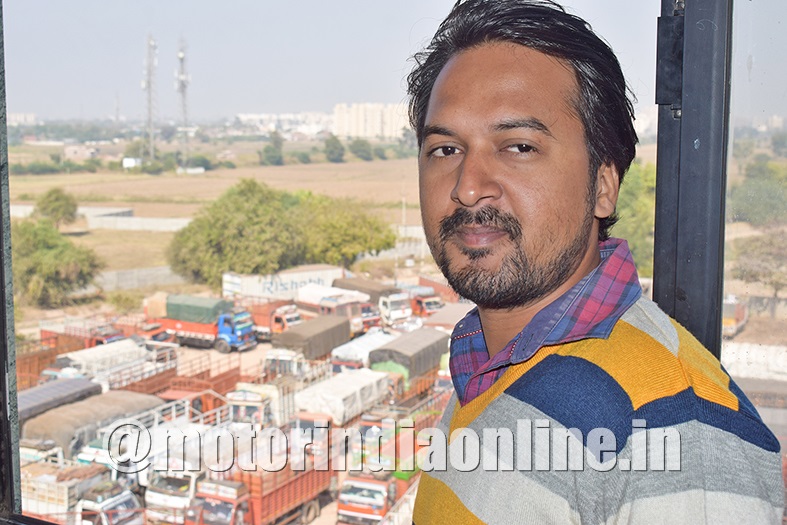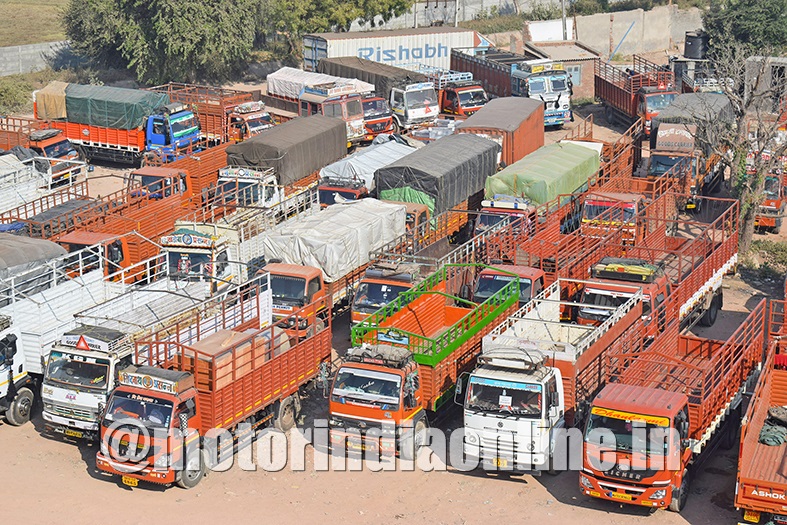Our aggregator from ‘The Transporter’ is amongst the many individual brokers that form a vital cog in the wheel that connects individual owner operators and SMEs in our country, making up a large portion of the fragmented transport industry.
India is experiencing rapid growth in the last few years, in plethora of segments like retail, tourism, hospitality, banking, infrastructure, IT, etc., to put itself amongst the fastest growing economies in the world. Transport, of both goods and people movement, inadvertently forms the foundation of this growth. While we have known several stories of the formal, more organized sector of transportation, in terms of the fleet operators owning large fleets, India still has its fare share of owner operators catering to Small and Medium Enterprises (SMEs) and occasionally a few big orders. Connecting these fragmented owner operators are many middle men, known as brokers or agents in common parlance, who make their living while bridging the supply and demand of a consigner’s need for goods transportation.
While driving past Sardar Patel Estate at Vatva Turning in Narol, Ahmedabad, we came across many such aggregators whose daily living, stems from this basic service of connecting truck operators to the suppliers. We spoke to Mr. Abhishek Pandey, Proprietor, The Transporter, who welcomed us into his world, that is called as a Truck Mandi or Transport Nagar in local terms, and shared the nitty-gritties of many brokers/agent/middlemen like him.
Elaborating about his operations, he says: “We handle the supply from the consigners who need to transport the loads on a daily basis. We take full responsibility about the goods, availability of correct vehicles at a competitive price. By doing so we ensure that both the consigner and the vehicle owner gets what they seek for. Our existence is primarily because of the daily requirements of a manufacturer and retailers wanting to ship their goods ranging from, spare parts, FMCG items, hardware’s, to heavy metals, mostly locally. However, for some big clients we do offer services outside our State. We facilitate, credible transportation on back of the individual owner operators or in some cases affiliates who would own less than 10 vehicles and who cannot afford to keep his vehicle idle and who are not committed to some corporates for regular contracts. Tying up with an intermediary like us assures them of 60-70 per cent of payments and daily loads.”
What Mr. Pandey clearly implies is that, given the fragmented nature of the Indian transportation that hardly has around 30 per cent of organized fleet operators working on fixed contracts, the rest of the market comprises of the open market and seeks business on a daily basis. A shipper requiring urgent vehicles reaches out to the broker who, in turn, reaches out to his trusted allies in the open market (truck operators) to get the affordable rates suitable for the goods to transport. The Transporter connects with the right truck operator and takes responsibility for pre-transit, transit and post-transit activities. This includes, procurement of vehicles, proof of delivery (POD’s) payment management and on-route status information for the suppliers.
“We ensure all the papers are ok of the vehicles and the vehicle is well-maintained. When we deploy a vehicle and a commitment is done for a full truck, we ensure the truck owners do not take any other sundry items, even if there is some space. They should not look for other small loads if the truck is not full. Our suppliers give us full payment for the full load and it would be unethical on our part to load somebody else’s load and also risk the security and timely delivery of the load that is committed,” affirms, Mr. Pandey.

On successful loading, they also have a thorough check to make sure the drivers understand the unloading points and route correctly. “We usually have to pay 60-70 per cent of the amount in advance to the vehicle owners and the rest is paid on delivery of the load, after the vehicle returns back to its origin destination,” adds Mr. Pandey.
Controlling the operations
According to Mr. Pandey, they are aware of the available inventory in their vicinity. However, they get an approximate status of the vehicles as soon as the vehicle comes back to its original destination after a day or two days of unloading. Usually it is the ICVs and SCVs that they require but they do have contacts with trailer and MHCV truck operators. “We get the order at least a day earlier about a transport and the number of vehicles to be deployed. We speak to truck owners/drivers accordingly if it is a local route or for interstate, in-order to fix the best rate. If the goods to be transported, requires large number of trucks, demand and supply game plays a key role. The one having more vehicles will try and hold an edge over the others and to extract the best rates from us. This happens because, the news of large load movements spreads like fire in the market and each owner operators as well as the broker/agent, wants to acquire the same. In such a challenging scenario, we resort to our trusted allies whom we know can negotiate for large volumes and reach on a consensus, seeing the reputation of the client,” informs Mr. Pandey.
Most of these activities happen mostly on phone calls and without much of technology. As we speak, we can see his phone buzzing on several occasions. Mr. Pandey, under his brand ‘The Transporter’ has been working since 2015 in Gujarat and has made a name for himself that garners him orders to deploy 25-30 vehicles per month. He says: “It was certainly difficult to start and to build rapport with truck owners locally but having worked in Kolkata prior to moving to Ahmedabad in search of better market, within a year I could crack deals to move from a meagre 5 trucks a month to 25-30 months. I have worked with products for Amul, Gujarat Ambuja Chemicals, Abhijeet Powers, Bhushan Power in the past. With my rapport and personnel attention to developing business, I have been able to generate a revenue of 2-3 lakhs a month.”
Ask him on his ambitions to grow beyond a broker and whether he would want to invest in his own truck to ensure that there is a guarantee of fleet at a given point. He plans to walk with trudge in a capital-intensive path. “The biggest problem with owning vehicle is to get permanent drivers or dedicated personnel to run them. Post that, is the challenge to pay EMIs at least in tune of minimum 20-25 thousand per month. If even three months, we are faced with some driver issue or challenges from fetching adequate load for the total operations cost, the chance of losing investments is high. Instead, I would focus to increase my trips from the current 25-30 to at least 60-100 per month spreading arms not merely in Gujarat but in UP, Delhi and Maharashtra.”
Irrespective of the threat from growing online aggregators, trying to disrupt the open market in the name of organized mode of operation, our country will have ample scope for many unsung or unorganized middleman doing their bit quietly forming a vital cog in the transportation industry. “Digital is yet to surpass our market completely and even if it does so we would have our fair share of business,” signs off Mr. Pandey.
